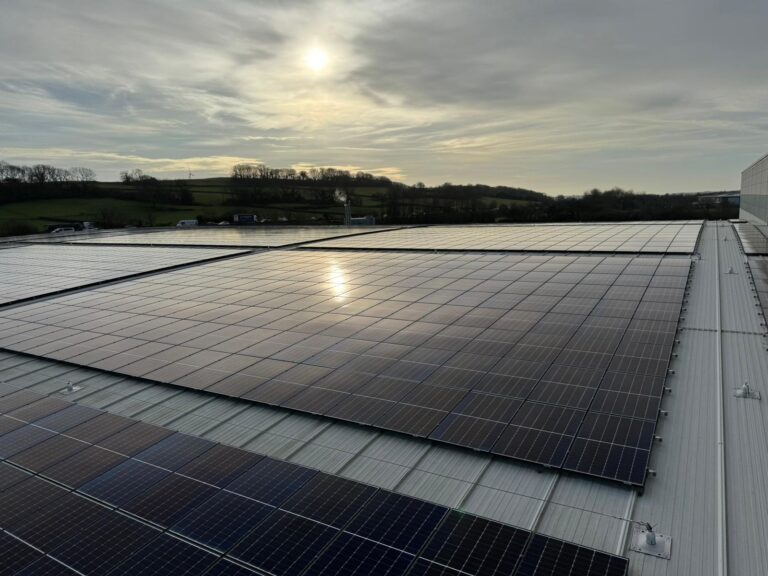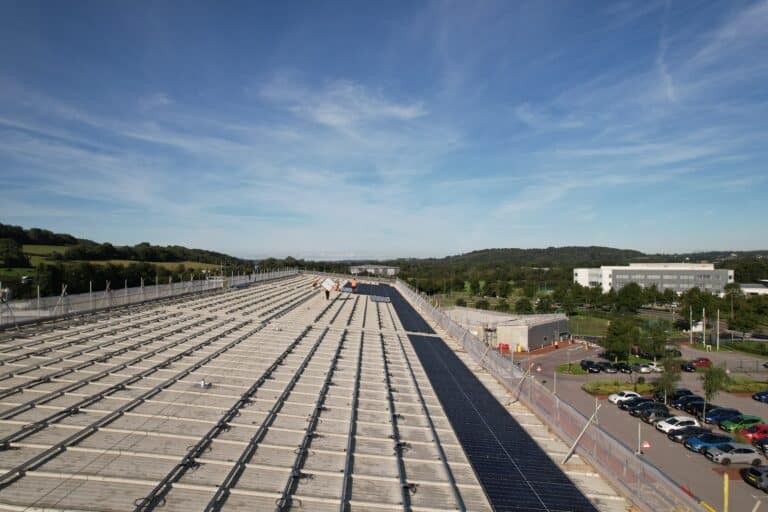Are commercial solar panels worth it
If you are a UK business owner asking, are commercial solar panels worth it?, the short answer is yes when the system is designed and installed correctly. Commercial solar panels can significantly lower electricity bills, enhance energy independence, and boost your company’s sustainability and decarbonisation strategy.
With UK businesses facing growing pressure to reduce emissions and aim for net zero, solar energy is one of the most practical and reliable ways to reduce carbon in daily operations. Across the country, forward-thinking organisations like factories, warehouses, offices, and farms are realising that solar power brings both environmental and financial benefits.
Over the 20 to 30-year lifespan of a well-installed system, the savings and reductions in carbon emissions can be considerable. In addition to cutting costs, solar panels help shield against future energy price increases, support corporate social responsibility efforts, improve ESG credentials, and can even raise your property’s value.
In summary, solar energy is no longer just an environmental choice; it is a smart investment and a crucial part of a long-term decarbonisation plan.
How Much Do Commercial Solar Panels Cost in the UK?
Commercial solar panels prices vary based on system size, available roof or land space, and the complexity of the installation. On average, commercial systems range from £650 to £950 per kWp.
Most business installations are between 20 kWp and over 200 kWp, with some larger projects reaching the megawatt scale. For example, a medium-sized warehouse might install a 100 kWp system, costing around £80,000 to £100,000.
While this may seem high, businesses can usually recover these costs in five to seven years through savings on electricity, tax incentives, and grants. Larger systems often provide better long-term value per kWp due to economies of scale.

Can I Claim Solar Panels as an Expense in the UK?
Yes, the UK government allows businesses to claim commercial solar panel installations as a business expense through schemes like Enhanced Capital Allowances (ECA). This means you can offset the cost of installing solar panels against your taxable profits, which lowers your corporation tax bill.
Solar panels are especially appealing for companies that want to improve sustainability and save money. The energy savings, long-term return on investment, and tax incentives often make solar a smarter choice than many other capital expenses.
How Much Does a Solar Farm Cost in the UK?
For businesses or investors looking at larger projects, solar farms are a viable choice. A small one-acre solar farm usually costs between £250,000 and £350,000, which covers installation, inverters, and grid connection. Bigger commercial solar farms can run into several million pounds depending on the number of panels, land preparation, and infrastructure needed.
Even with higher initial costs, solar farms enjoy economies of scale. This allows them to produce energy at a lower cost per kilowatt-hour than smaller systems. For companies that have land available, this can be a smart investment. It can generate income from electricity sales or help meet their energy needs.
Return on Investment and Savings with Commercial Solar
Commercial solar panels are a long-term investment. One of their biggest advantages is predictable ROI. After installation, electricity costs drop significantly, often covering 20 to 50 percent of your business’s energy needs. Over a 25-year lifespan, businesses can save hundreds of thousands of pounds.
The ROI period is usually five to ten years. After this, the electricity generated is effectively free. Adding battery storage increases savings by allowing businesses to store excess energy. They can use this stored energy during peak hours or grid outages, which improves self-consumption and reduces reliance on the National Grid.
Energy Independence and Reliability
Commercial solar offers more than just financial benefits; they also provide energy independence. Businesses that depend on grid power face risks from price increases, outages, and blackouts.
Solar panels, especially when combined with energy storage, guarantee a steady supply of electricity. This reliability is essential for operations that depend on machinery, computers, refrigeration, or medical equipment.
For instance, farms using solar panels with battery storage can keep milking systems or water pumps running during grid outages. Warehouses and offices can maintain lighting, servers, and production equipment, preventing costly interruptions to their operations.

Sustainability and Corporate Responsibility Benefits
Installing solar panels shows a commitment to sustainability. UK businesses now face growing expectations to show their environmental responsibility through ESG reporting, corporate social responsibility efforts, and carbon reduction goals.
Solar panels cut carbon emissions and improve a business’s environmental impact, which attracts investors, clients, and employees.
Visible solar installations, like roof-mounted panels or solar canopies in parking lots, offer clear evidence of sustainability efforts and boost the company’s public image.
Comparing Options: Buy or Lease for Businesses
Businesses can either buy or lease solar panels. Buying maximises financial benefits, including government incentives and long-term electricity savings. Leasing reduces upfront costs and can shift maintenance responsibilities to the provider, but long-term savings might be lower.
The right option depends on the business’s cash flow, willingness to spend capital, and long-term energy plan. Many UK businesses discover that buying, along with tax incentives and grants, provides the best financial results over time.
Some businesses may also ask:
How much does a one-acre solar farm cost?
A typical one-acre solar farm costs around £250,000 to £350,000, with outputs averaging 150 to 200 MWh per year depending on location and panel efficiency.
Will solar panels cover all my energy needs?
While commercial panels can cover a large portion of energy use, grid connection remains important for peak loads or cloudy periods. Battery storage improves self-consumption.
Are solar panels a good investment during rising energy prices?
Yes, solar panels lock in energy costs for decades, protecting businesses from price volatility.
FAQs About Commercial Solar Panels Costs

Yes. Even smaller energy users can achieve meaningful savings and reduce carbon footprint.

Panels can cover a significant portion of electricity needs, especially when combined with battery storage.

Excess energy is stored in batteries for later use, improving efficiency and reducing reliance on the grid.

Your business remains connected to the grid to ensure uninterrupted power.

ROI is typically five to ten years, after which your electricity savings become pure profit.
The Smart Business Case for going commercial solar
Commercial solar panels are more than just a green initiative. They are a practical, cost-effective, and sustainable solution for UK businesses, offering:




Whether you are a small office, a warehouse, a farm, or exploring a larger solar farm project, commercial solar panels make sense financially and environmentally.
Click here to get a FREE no obligation solar proposal from Excel Energy, just clear answers and an honest assessment of how solar can benefit your business.
